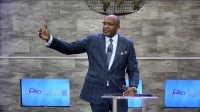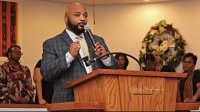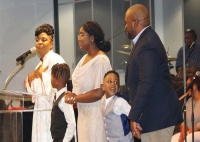Andre Kimo Stone Guess
@aeducatedguess
theundefeated.com

With Easter approaching, pastors and leaders must minister without violating what CDC suggests are best health practices
The black church in America is older than the country itself. The first black churches were formed in this country in the early 1770s, some as early as 1773. Since that time, the black church has endured and eventually overcome every crisis that this country has seen.
The COVID-19 crisis is different.
For the first time, the black church finds itself facing a major crisis that affects not only its membership, but also every person on the planet. And the church is facing this crisis without one of the most essential and enduring parts of its legacy – the ability of its people to gather, fellowship, pray and worship together.
The entire world is facing a health crisis, and as a result we are experiencing sweeping social, political, cultural and economic change. People all over the world are advised, and in some cases, mandated, to shelter in place and keep their social distance from their fellow man to stop the spread of the virus.
How is the black church dealing with the fallout from this crisis?
Pastors and church leaders around the country are scrambling to figure out how they are going to weather this storm.
Worship Services and the New Normal
On March 9, Rev. Vincent E. James, Sr., pastor of the Elim Baptist Church in Louisville, Kentucky, decided to cancel all services for his church indefinitely. James was one of the first pastors in the city to decide to suspend worship services. This was two days before Kentucky Gov. Andy Beshear urged churches across the state to cancel worship services to help prevent the spread of the virus.
“I made the decision based upon the information that I had,” James said. He is also the chief of community building for the city of Louisville. As a member of the mayor’s cabinet, James was well aware of the potential ramifications of the pandemic if proper measures were not taken immediately. “After the governor’s announcement, I called the president of the Interdenominational Ministerial Coalition and he called together the membership and I was able to present to about 75 pastors and give them the information that I had.”
James was joined in his presentation to the group by councilwoman Keisha Dorsey, who has a background in public health. “After councilwoman Dorsey and I gave them all of the facts that we had, I said to them that the faith is not in staying open, the faith is trusting the people to continue to figure out creative ways for us to stay connected.”
Most of the pastors who were interviewed for this story are using social media and streaming platforms to bridge the gap between their worship services and Bible studies and their congregations until it is safe to gather in groups again.
Rev. Elect John Ray Jr., minister of worship arts for Light of the World Christian Church in Indianapolis, is preparing for the new normal of worship without a congregation. “We are playing catch-up like many other organizations, including the government [in trying to deal with this],” he said. “Last Sunday we streamed a previously recorded service on UStream with a live remote introduction and also a live greeting at the end. That’s the format that we are using right now until we can figure out how to move forward.”
Others are struggling with the decision to completely shut their doors. Rev. Victor J. Grigsby, pastor of Central Baptist Church in Pittsburgh, is trying to find the right balance between virtual and live worship, especially for the upcoming Holy Week, April 5-11.
“The real stress for us is coming around Palm Sunday and Easter here in the next two weeks,” he said. “Those are the hallmark Sundays in Christian worship and we are trying to figure out how we do this without violating what the CDC suggests are best health practices.”
For the time being, he has decided to go with the previous recommendation by the Centers for Disease Control and Prevention to avoid gatherings of groups larger than 50 people. They are going to stream their services but will have a small group there to lead the services. “We’ve asked for leadership – deacons, deaconesses, trustees, ministers and ministers’ spouses and our band and a praise team along with our media staff to attend,” he said. “That’s about 50 people. We have sent out notices letting everyone know that this is what we are doing. We can’t stop people from coming in the door, so hopefully people will decide to stay home.”
Billy Thompson, former NCAA and NBA champion and chaplain for the Miami Heat, is the founding and lead pastor of Jesus People Proclaim International Church in Deerfield Beach, Florida. He has decided to go about business as usual.
“We are able to still function in Deerfield Beach because our mayor has not put any curfews or restrictions on gatherings,” he said. “The CDC has suggested that gatherings be restricted to no more that 50 and then 10 people, but that is a suggestion, not a requirement by law. So, being a church, I am going to be there preaching. I’m going to be there praying for people, because at times like this the church is necessary. So, we’re telling our people that if you want to come to church, know that other people will be there and if you want to shake hands, you can shake hands. It’s according to your faith. If anyone doesn’t want to come, then you can watch us online.”
For Thompson, getting through this crisis and ministering to those who may have the virus is a matter of faith. “Of course, we are telling people if they are not feeling well or have flu-like symptoms, that they should definitely stay home,” he said. “But, also I’ve been telling people that if they have the virus and they need someone to pray for them, to call the church and I will call them and pray for them over the phone and if they need me and really want me to come and pray with them, I will come and pray with them and touch them. Because that’s where my faith is.”
Providing for the People
While social media and streaming can help to deliver Bible study and worship services to parishioners, one major concern for many pastors is what they will do about funerals. Not necessarily for people who may die due to the coronavirus, but for any member who dies during this time, especially the elderly.
“People will pass away and we will not be able to celebrate them in our traditional custom,” said Janae Pitts-Murdock, interim pastor of Light of the World. “One of the greatest moments in a believer’s life, especially for the family, is the ability for them to come together to celebrate the life of their loved one who has transitioned. It worries me that we as a congregation won’t be able to perform those rituals like we are accustomed to.”
Even though most churches are canceling or curtailing gatherings for their worship services, many are still providing much-needed services for their communities.
Light of the World and Central Baptist are providing meals to go for the community with minimal contact. St. Peter Claver Catholic Church, one of the oldest black Catholic churches in America, is located in the historic Treme neighborhood of New Orleans. Even though the pastor, Rev. John Asare-Dankwah, in following the directives of the archbishop as well as the governor and mayor, has canceled mass indefinitely, he still feels a strong need to serve the community.
“We do have a pantry and we open it every Tuesday and Thursday,” he said. “I have not decided to close that at this time, but I am asking people to take all of the necessary precautions to make it safe.”
Churches are also having to be creative in dealing with the sick and shut-in. Most churches have clergy and laypeople who serve the needs of the infirm, usually in person, but the pandemic is making personal contact with that at-risk population impossible.
“One of our members recently had a stroke,” said JoAnn James, first lady of Elim Baptist Church. “The deacons and ministerial staff couldn’t get to her in the hospital, but we were able to FaceTime with her and her son. We were able to pray for her and let her know that even though we couldn’t be there in person that we were still with her.”
Words Matter: ‘Social Distancing’ and ‘Cancel’
A new buzzword for this time is “social distancing.”
Grigsby says that the church needs to be careful about how we let that phrase seep into our psyches.
“[The church] can endure physical distancing,” he said, “… being separated and pulled apart, mothers separated from their children, fathers being pulled away from their families, whether it’s been through slavery or Jim Crow – we’ve experienced that before. But, even when we were physically distanced, we were still socially connected. The vocabulary and terminology now threatens the very fiber of our community. We need each other. We’ve always needed each other. Although we might fight and fuss and argue within the church and without, we still understand that we are there for each other. Especially when others come against us, we know how to pull together and fight as one.”
Another word that is being heard constantly is “cancel.” Pitts-Murdock is cautious in her use of the word.
“As a pastor, I am working to intentionally avoid cancel language,” she said. “The world is hearing a lot of rhetoric around canceling and shutdown, but the church never cancels, never shuts down. Even when we don’t gather in physical space in the building, we are always open. We have to reconsider how we gather, how we minister, but as a pastor I am avoiding language that even exudes the idea that we could ever cancel.”
Financial Implications
The pandemic is wreaking havoc on the economy and this has the potential to be devastating to the black church because members cannot get to the church to give. Churches rely on their membership for their financial support and like many of its members, black churches are living week to week.
“[The black church] is struggling, said Grigsby. “We have never been at this place before. The black church doesn’t have endowments. We don’t have trusts like other major white churches do to rely on. We are hand-to-mouth just like our parishioners. And as a result of that, it will be necessary for us to lay off staff and paid ministry personnel. I think at best that we can go two to four weeks, but after that we have to start cutting back on staff.”
Even though the outlook is bleak, many churches have seen and survived dark financial forecasts before. Bishop Larry James Baylor, senior pastor of Faith Miracle Temple in St. Louis, has been down this road before.
“When we went through the 2008 crash, we didn’t suffer through that, because we are people of faith,” he said. “We grew from that. We were hiring people during that time. And, because we are people of faith, we believe that the Lord is going to see us through this dark period. Obviously, we are trying to curtail things. We aren’t spending as much. It’s going to affect us for sure but at the end of the day I believe that we will get through this like we get through everything else.”
Many churches offer online giving, but even in the best of times the amounts given electronically may not equal the amounts that are given in person via cash or check. Being able to convert members to online giving is a challenge that all churches are facing during the pandemic.
Back to the Future
Even before the pandemic, many black churches struggled with using technology as a tool to reach people and connect with their members. Now churches without those tools in place might find it hard to serve their members and communities.
“Some churches don’t have a website, Facebook page or anything,” said Vincent James.” Some of that is not because of a lack of resources, it’s just a lack of interest or desire or need to change.”
But according to Paul J. James, pastor of CareView Community Church in Lansdowne, Pennsylvania, outside of Philadelphia, what may soon happen is a move back to the way of the first-century church. The Greek word for church in the New Testament is ekklesia (or ecclesia). It comes from ek, meaning “out from and to” and kaleo, meaning “to call.” It is a group of people called out from one place and to another – a group of people who have been called out of the world and to God; that is the church. The church is not a building, but the people.
# # #


